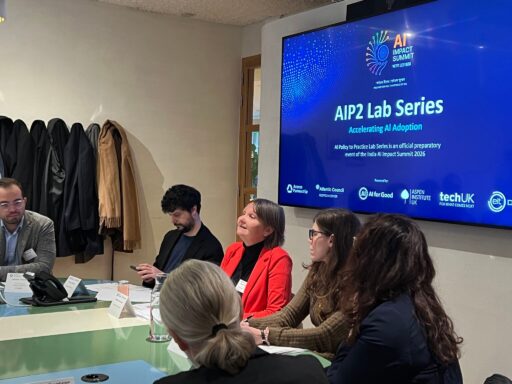Positioning Malaysia as a regional leader in the digital economy – a MYR257.2-billion (USD61.3-billion) digital opportunity by 2030
Read the Bahasa Melayu report here
Malaysia’s digital economy is growing rapidly and has been identified by the government as a key growth area. Between 2015 and 2018, Malaysia’s digital economy experienced robust growth of eight percent annually, which was higher than its gross domestic product (GDP) growth of five percent per year during the same period.1 To capture the opportunities emerging from its digital economy, the Malaysian Government launched the “Malaysia Digital Economy Blueprint” (“MyDIGITAL”) in February 2021.2 The government’s strategy aims to transform the country into a digitally-driven, high-income nation and a regional leader in the digital economy by 2030. However, digital adoption remains low, and uneven across business sizes and sectors. Although the average Internet penetration rate of businesses in the country has reached 73 percent, Internet usage is highly concentrated in the manufacturing sector (90 percent) but lagging in other sectors such as agriculture (61 percent).3 Unlike large firms, digital adoption among small and medium-sized enterprises (SMEs) is shown to be lower.4
The COVID-19 pandemic has amplified the importance of digital transformation in expediting short-term economic recovery and boosting long-term economic resilience. By allowing businesses to engage customers digitally, resume business operations, and address logistical bottlenecks, technologies can help businesses manage the severe economic impacts of COVID-19. A study has found that, globally, the pandemic has effectively pushed forward the digital revolution by five years, providing an opportunity for Malaysia to ride the next digital wave.5 Digital transformation will be important to boost Malaysia’s economic recovery efforts and enhance the long-term resilience of its economy in the post-pandemic future. This also makes it essential for policymakers to understand the potential economic value of technology applications for Malaysia – and the necessary steps to realise it.
AlphaBeta has conducted a study (commissioned by Google) to examine the economic significance of digital technologies in Malaysia, especially in non-technology sectors. This study finds that if leveraged fully, digital transformation can unlock MYR257.2 billion (USD61.3 billion) worth of annual economic value in Malaysia by 2030.
Key messages from the research include:
- There is a significant economic prize attached to accelerating Malaysia’s digital transformation. If fully leveraged by 2030, digital technologies could create up to MYR257.2 billion (USD61.3 billion) in economic value. This is equivalent to about 17 percent of the country’s GDP in 2020. Of this total digital opportunity, a substantial 72 percent could be driven by technologies that help businesses and workers mitigate the economic impacts of COVID-19. For example, Internet of Things (IoT) devices embedded in distribution networks can report the positions of goods and services remotely, allowing businesses to optimise transportation and reduce distribution and supply chain operating costs by up to five percent.
- There are three areas of action required for Malaysia to fully capture its digital opportunity: (i) facilitate digitalisation in both the public and private sectors; (ii) build the nation’s digital talent; and (iii) promote digital trade opportunities. Malaysia is already making significant progress in these areas, such as the “MyDIGITAL” blueprint, and could consider pushing further on some parts of its policy agenda. These include facilitating digitally-enabled “green recovery” efforts to boost resilience in the post-pandemic era, similar to Singapore’s Green Plan 2030 which includes funding for the development of new and emerging technologies to capture opportunities in the green economy; providing incentives to shift employers’ mindset towards “reskilling as a first resort”, such as Luxembourg’s “Digital Skills Bridge” programme, and taking a more proactive stance to promote the regional digital trade agenda. Examples include driving the implementation of the ASEAN Data Management Framework and Model Contractual Clauses on Cross Border Data Flows.
- Google has been instrumental to advancing the country’s digital transformation journey in its contributions. Through programmes such as “Mahir Digital Bersama Google”, Google is offering free workshops to help SMEs learn digital skills and adopt digital tools to establish and grow their online presence. Google.org, Google’s philanthropic arm, supported The Asia Foundation with a USD3.3-million grant to launch the “Go Digital ASEAN” initiative. The initiative aims to close the digital gap in ASEAN countries, including Malaysia, and improve digital literacy among communities in rural regions and underserved areas. Google also plays a part in helping businesses in Malaysia promote digital trade opportunities. YouTube serves as an important platform for local content creators to expand their presence globally and provides an alternative source of income, particularly during the economic downturn due to the COVID-19 pandemic. In addition, Google facilitates job creation in Malaysia. By enabling businesses to unlock new revenue streams and expand their businesses through the use of Google Ads, AdSense, and YouTube, Google indirectly supports over 31,000 jobs in Malaysia.
Please visit the following links to view the report:








